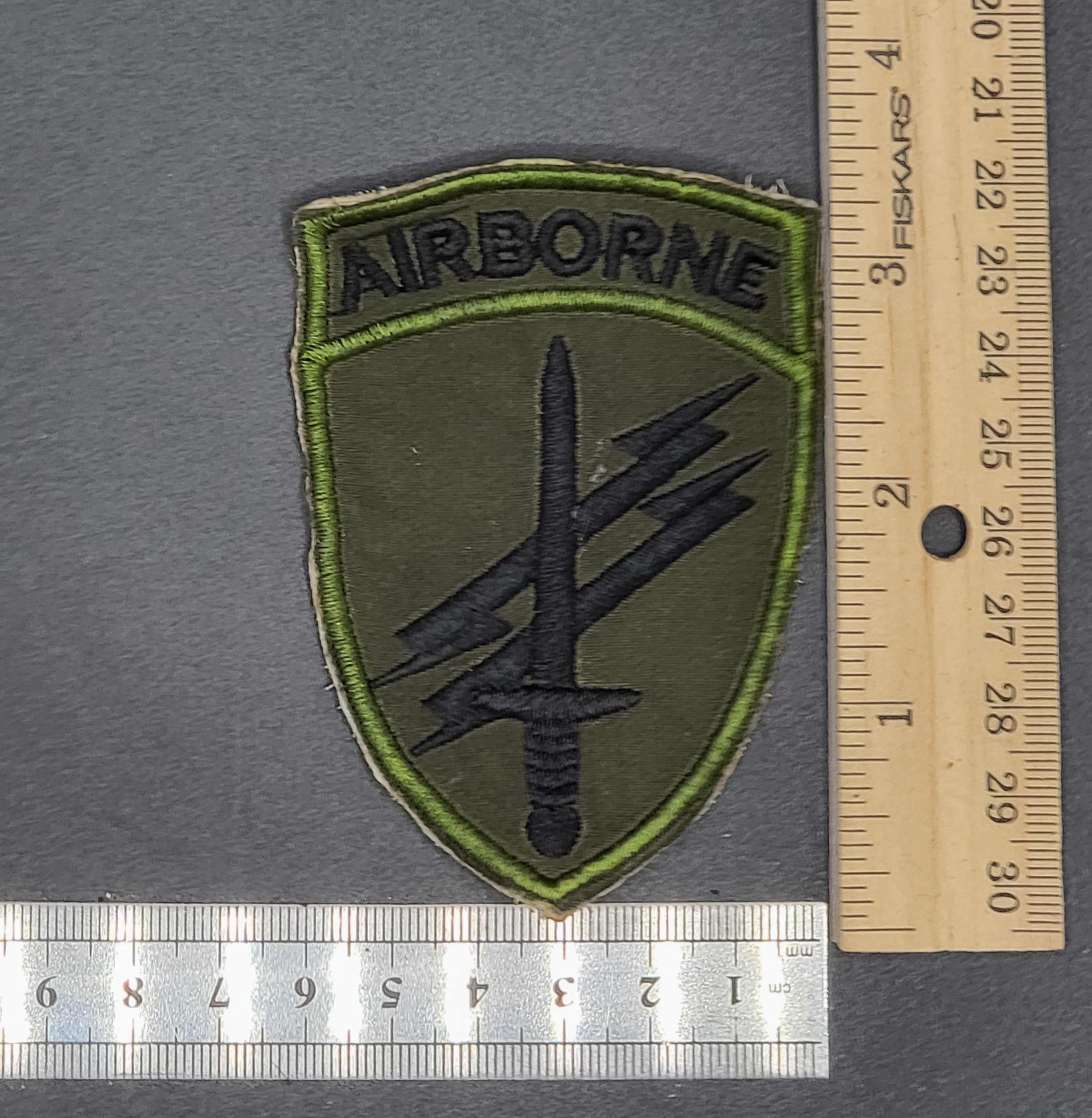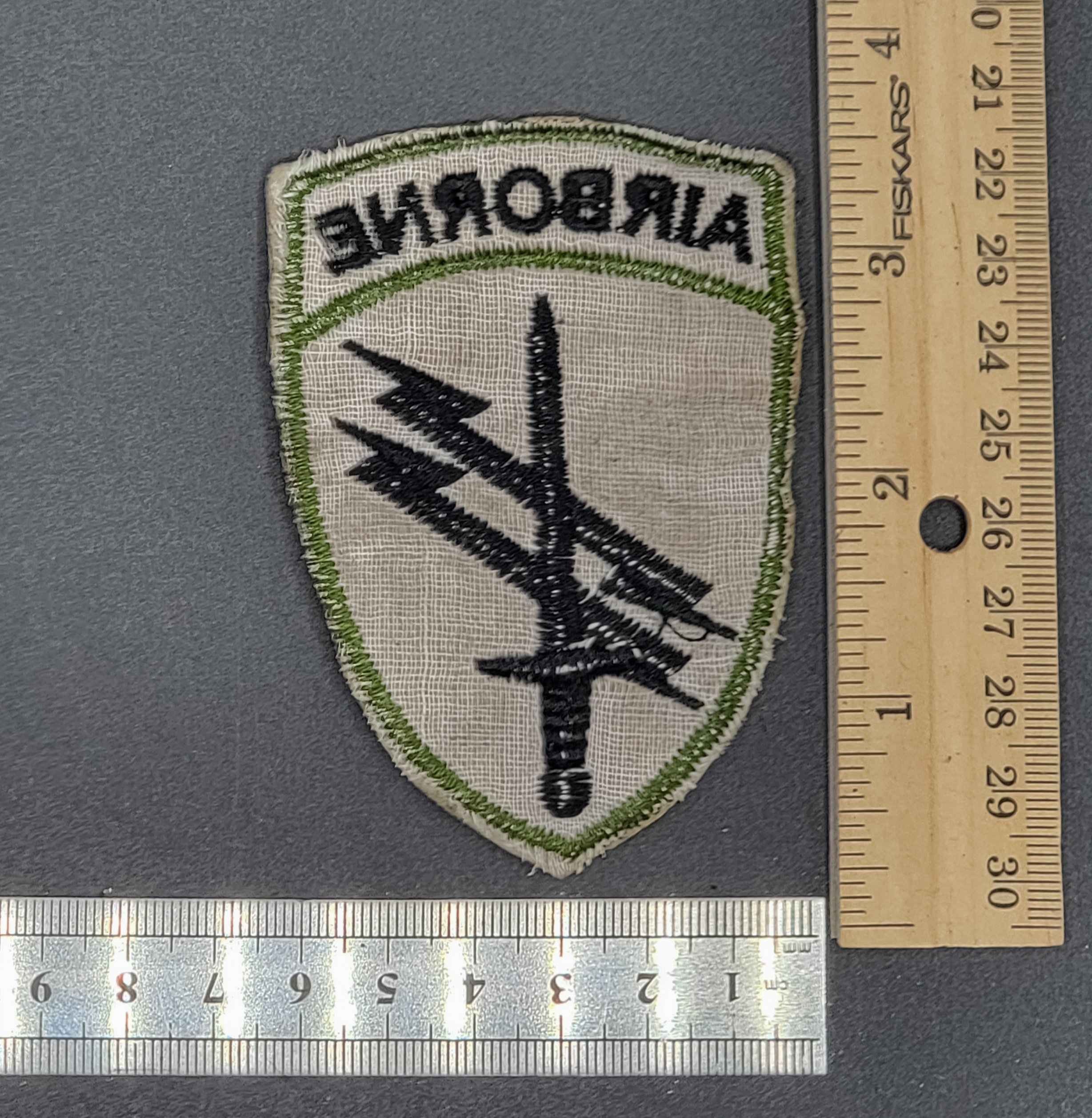Subdued Airborne Patch - US CIVIL AFFAIRS and Psychological Ops Command
United States Army Civil Affairs and Psychological Operations Command
Subdued Patch - Airborne - Elite Ops -
United States Army Civil Affairs and Psychological Operations Command
The United States Army Civil Affairs and Psychological Operations Command (Airborne), USACAPOC(A), or CAPOC was founded in 1985 and is headquartered at Fort Bragg, North Carolina.
USACAPOC(A) is composed mostly of U.S. Army Reserve Soldiers in units throughout the United States.
The size of the Command is nearly 13,500 Soldiers, which is 76% of the Department of Defense's Civil Affairs forces and 63% of Psychological Operations forces.
The current Commanding General is Major General Jeffrey C. Coggin, who assumed command in July 2020.
Historically, USACAPOC(A) was one of four major subordinate commands composing the U.S. Army Special Operations Command (USASOC).
However, in May 2006, the reserve component of USACAPOC(A) was transferred to the U.S. Army Reserve Command.
The Army's active duty Special Operations Civil Affairs and Psychological Operations units, along with the Civil Affairs and Psychological Operations Force Modernization/Branch Proponents, continue to fall under the U.S. Army Special Operations Command and United States Army John F. Kennedy Special Warfare Center and School, respectively.
The Active Component Civil Affairs Brigade—the 95th Civil Affairs Brigade—and the two active component Psychological Operations Groups
- the 4th Psychological Operations Group and
- the 8th Psychological Operations Group
fall under USASOC.
U.S. Army Reserve Civil Affairs and Psychological Operations constitute 5% of the U.S. Army Reserve's total force, but account for approximately 20% of Army Reserve deployments. Reserve Civil Affairs are deployable specialized forces within the Reserve’s.
The command's Soldiers bring civilian expertise and education that is typically not found among active-duty soldiers. The projects these elements coordinate are worldwide, but more recently have focused on the Iraq, Afghanistan, and the Horn of Africa regions.
United States Army Civil Affairs and Psychological Operations Command
Subdued Patch - Airborne - Elite Ops -
United States Army Civil Affairs and Psychological Operations Command
The United States Army Civil Affairs and Psychological Operations Command (Airborne), USACAPOC(A), or CAPOC was founded in 1985 and is headquartered at Fort Bragg, North Carolina.
USACAPOC(A) is composed mostly of U.S. Army Reserve Soldiers in units throughout the United States.
The size of the Command is nearly 13,500 Soldiers, which is 76% of the Department of Defense's Civil Affairs forces and 63% of Psychological Operations forces.
The current Commanding General is Major General Jeffrey C. Coggin, who assumed command in July 2020.
Historically, USACAPOC(A) was one of four major subordinate commands composing the U.S. Army Special Operations Command (USASOC).
However, in May 2006, the reserve component of USACAPOC(A) was transferred to the U.S. Army Reserve Command.
The Army's active duty Special Operations Civil Affairs and Psychological Operations units, along with the Civil Affairs and Psychological Operations Force Modernization/Branch Proponents, continue to fall under the U.S. Army Special Operations Command and United States Army John F. Kennedy Special Warfare Center and School, respectively.
The Active Component Civil Affairs Brigade—the 95th Civil Affairs Brigade—and the two active component Psychological Operations Groups
- the 4th Psychological Operations Group and
- the 8th Psychological Operations Group
fall under USASOC.
U.S. Army Reserve Civil Affairs and Psychological Operations constitute 5% of the U.S. Army Reserve's total force, but account for approximately 20% of Army Reserve deployments. Reserve Civil Affairs are deployable specialized forces within the Reserve’s.
The command's Soldiers bring civilian expertise and education that is typically not found among active-duty soldiers. The projects these elements coordinate are worldwide, but more recently have focused on the Iraq, Afghanistan, and the Horn of Africa regions.
United States Army Civil Affairs and Psychological Operations Command
Subdued Patch - Airborne - Elite Ops -
United States Army Civil Affairs and Psychological Operations Command
The United States Army Civil Affairs and Psychological Operations Command (Airborne), USACAPOC(A), or CAPOC was founded in 1985 and is headquartered at Fort Bragg, North Carolina.
USACAPOC(A) is composed mostly of U.S. Army Reserve Soldiers in units throughout the United States.
The size of the Command is nearly 13,500 Soldiers, which is 76% of the Department of Defense's Civil Affairs forces and 63% of Psychological Operations forces.
The current Commanding General is Major General Jeffrey C. Coggin, who assumed command in July 2020.
Historically, USACAPOC(A) was one of four major subordinate commands composing the U.S. Army Special Operations Command (USASOC).
However, in May 2006, the reserve component of USACAPOC(A) was transferred to the U.S. Army Reserve Command.
The Army's active duty Special Operations Civil Affairs and Psychological Operations units, along with the Civil Affairs and Psychological Operations Force Modernization/Branch Proponents, continue to fall under the U.S. Army Special Operations Command and United States Army John F. Kennedy Special Warfare Center and School, respectively.
The Active Component Civil Affairs Brigade—the 95th Civil Affairs Brigade—and the two active component Psychological Operations Groups
- the 4th Psychological Operations Group and
- the 8th Psychological Operations Group
fall under USASOC.
U.S. Army Reserve Civil Affairs and Psychological Operations constitute 5% of the U.S. Army Reserve's total force, but account for approximately 20% of Army Reserve deployments. Reserve Civil Affairs are deployable specialized forces within the Reserve’s.
The command's Soldiers bring civilian expertise and education that is typically not found among active-duty soldiers. The projects these elements coordinate are worldwide, but more recently have focused on the Iraq, Afghanistan, and the Horn of Africa regions.

